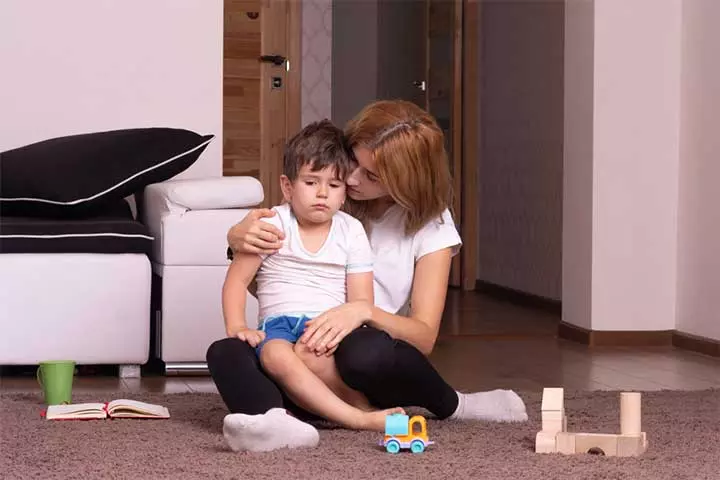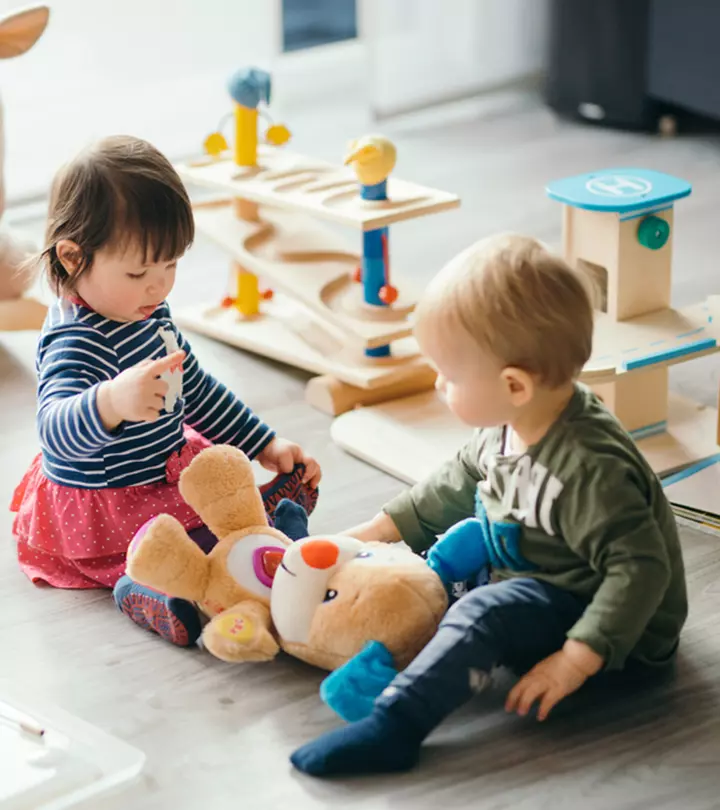

Shutterstock
Little ones are most often associated with poop. From soiled diapers to impromptu potty breaks, there seems to be a lot of pooping in the beginning stages of life. However, everything seems to come to a standstill (quite literally) when your child stops pooping. This might be unsettling for you and cause a lot of discomfort for your little one.
It is worth noting that most toddlers, at least once in their lifetime, hold back their poop. The reasons are plenty, and more often than not, they are not a cause for concern. We’ve listed the reasons why this could be happening and what you can do about it.
The Possible Causes
Image: Image Shutterstock
You’re most likely panicking, but don’t worry — in most cases, the reasons associated with why your toddler won’t poop are pretty harmless. Let’s look at what the possible causes can be:
- Your Child Is Constipated – If your child’s bowel movement has suddenly become less frequent or close to nil, the chances are that the child is constipated. Several reasons can cause constipation, but lack of fiber in the diet, excessive fiber in the diet, or a sudden change in the diet are the top reasons (1).
- Your Child Has Anxiety Or Sensory Problems – If your child is highly sensitive to external stimuli, the smell of feces can be off-putting — so much so that they don’t want to poop. This has been observed mainly in children who have sensory processing disorder or autism (2), (3).
- Your Child Is Scared – It could be possible that the last time your little one pooped, it was a bad experience. That is, the stool was hard to pass and painful. Or, it can be something as simple as messing the toilet. The last experience was a bad one, so the child tends to think that pooping, in general, is an awful experience, thereby refraining from it altogether.
- It’s A Power Play – Sometimes, your child isn’t pooping simply because you ask your child to poop. When children are babies, you can’t see them asserting their independence, but as they grow up, you’ll see that the power struggles have begun.
- Your Child Isn’t Fully Potty Trained – If you’ve just started to potty train your child, you might face some pooping issues. Your child probably doesn’t understand what it means to poop in the potty and is perhaps waiting for you to put the diaper back on, so they can poop.
- Your Child Has Other Priorities – Your child may be thinking — why poop when I can play instead! It’s a known fact that pooping can sometimes take long, unlike peeing. Your child probably thinks that missing a dump for their favorite TV show is worth it!
The Possible Medical Causes
Image: Image Shutterstock
We did say that the fact your child isn’t pooping isn’t a cause for concern. However, we can’t completely rule out specific factors that might be alarming. These include:
- Gastrointestinal Issues – Constipation is sometimes caused due to gastrointestinal disorders such as Irritable Bowel Syndrome, Celiac disease, Hirschsprung’s disease, or lactose intolerance (4).
- Thyroid Issues – Get your child’s thyroid level checked. One of the symptoms associated with hypothyroidism is constipation (5).
- Fecal Impaction – Regular constipation can lead to hardened poop, which is stuck in the colon. This can make it hard to pass motion (6).
- Colonic Inertia – Sometimes, the colon or the gastrointestinal system slows down. The stool does not move out efficiently. This can be a possible reason (7).
What Can You Do To Help
Image: Image Shutterstock
It is important to tackle this problem both physically and mentally. On the one hand, you can ease the physical discomfort that the child is suffering from. On the other hand, you’ll have to change the negative mindset associated with pooping. Let’s look at what you can do:
- Take It Slow – Rushing them to poop might have the opposite effect. You’re only stressing yourself and your baby. It is important to be patient with your child. Try to get your child to relax as well.
- Talk To Your Child – You could try explaining to your child why it is important to pass motion. You can explain why all living things poop. Tell them it is a natural, necessary process that is good for the body.
- Give Them Sufficient Water – One of the best ways to relieve constipation is to stay hydrated. Water can help soften stools, and this, in turn, helps make bowel movements easier.
- More Fiber Into The Diet – Maybe it’s time to incorporate some good old fiber into your child’s meal plan. Insufficient consumption of fiber can cause constipation (8).
- Check If The Toilet Is Uncomfortable – Your child might find it challenging to poop if the toilet seat is too small, too big, or too high.
More often than not, your child isn’t pooping due to constipation. Give it some time — try not to force your child to pass motion when they are not ready. You can help your child like we’ve mentioned above. Try to be calm and patient as you can since children tend to get distressed quickly. However, if this has gone on for too long and nothing seems to be working, consult your doctor. Have you experienced trouble with your child’s pooping behavior? Tell us what you did to help your child in the comments below!
Community Experiences
Join the conversation and become a part of our nurturing community! Share your stories, experiences, and insights to connect with fellow parents.















